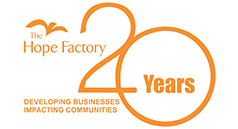How To Sustain A Successful social Enterprise Project
"There are several key factors to ensure the sustainability of a social enterprise, Says Elizabeth Zambonini, CEO of The Hope Factory".
This is one of the lessons she has learned from the expertise and experience she has garnered through having created and nurtured The Hope Factory, a highly viable SAICA enterprise development initiative.
The Hope Factory aims to dramatically impact and improve the lives of previously disadvantaged unemployed South Africans by providing them with an opportunity to be trained and empowered and thus become financially productive.
Since 2001, more than 650 unemployed people have directly benefited from The Hope Factory's job and wealth creation efforts.
"Several factors working in combination are required to achieve long-term success, of which a sound development model that achieves sustainable results is probably the most important," says Zambonini.
"Once that is in place, the success stories and proven track records can be used to access funding, and attract skills, partners and investors. People want to put their resources into something that works and is sustainable, and can be monitored as well as report on in its deliverables."
She identifies other success criteria as including:
- Strategic partnerships and alliances: this would include key funders; service providers such as a good public relations and/or marketing providers to identify and communicate with key investors and supporters; and involved Board members;
- Multiple revenue streams to reduce the risk of being dependent on one key donor, and also help to create scope for growth. One should also create one's own sources of income, such as by selling products or services; and
- Committed partners and stakeholders that feel part of the project. Sustainability of such commitment is achieved by regular communication involving activity updates; regular, consistent and accurate reporting; site visits; and tangible involvement.
Zambonini highlights the prime factors in the success of The Hope Factory as a development model.
"We adopt a three-phased approach involving training, on-site work experience and entrepreneurial mentorship. We focus on developing each individual via a personalised programme that is tailored to the individual's goals/career path. A critical success factor to any person's future financial sustainability is their self esteem and confidence to be able to go out there and try. This is developed throughout the programme."
The first phase consists of a broad-based training programme designed to equip the trainees with a variety of skills – a holistic, practical and project-based approach.
This 15-week training programme covers:
- Technical skills like sewing, pattern-making, beadwork and other crafts;
- Business skills that encompass entrepreneurship and small business techniques; and
- Life skills such as time management, CV writing and HIV/Aids prevention.
Graduates then move into The Hope Factory's second – job creation/ incubator – phase, where entrepreneurs gain work experience and earn an income.
In phase three, entrepreneurs are encouraged to start their own businesses, with The Hope Factory continuing to provide support in the form of advice and access to markets.










